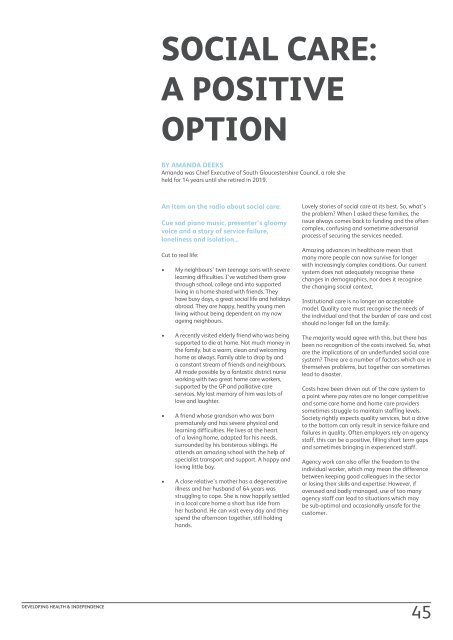The Vision Project
Throughout 2019, Developing Health & Independence (DHI), have been marking their 20th anniversary as a charity by looking to the future. Through articles, events and podcasts, they've asked people to answer the question of how we can achieve their vision of ending social exclusion. This collection of articles includes the contributions of experts from across public life and the political spectrum.
Throughout 2019, Developing Health & Independence (DHI), have been marking their 20th anniversary as a charity by looking to the future. Through articles, events and podcasts, they've asked people to answer the question of how we can achieve their vision of ending social exclusion. This collection of articles includes the contributions of experts from across public life and the political spectrum.
Create successful ePaper yourself
Turn your PDF publications into a flip-book with our unique Google optimized e-Paper software.
SOCIAL CARE:<br />
A POSITIVE<br />
OPTION<br />
BY AMANDA DEEKS<br />
Amanda was Chief Executive of South Gloucestershire Council, a role she<br />
held for 14 years until she retired in 2019.<br />
An item on the radio about social care:<br />
Cue sad piano music, presenter’s gloomy<br />
voice and a story of service failure,<br />
loneliness and isolation...<br />
Cut to real life:<br />
• My neighbours’ twin teenage sons with severe<br />
learning difficulties. I’ve watched them grow<br />
through school, college and into supported<br />
living in a home shared with friends. <strong>The</strong>y<br />
have busy days, a great social life and holidays<br />
abroad. <strong>The</strong>y are happy, healthy young men<br />
living without being dependent on my now<br />
ageing neighbours.<br />
• A recently visited elderly friend who was being<br />
supported to die at home. Not much money in<br />
the family, but a warm, clean and welcoming<br />
home as always. Family able to drop by and<br />
a constant stream of friends and neighbours.<br />
All made possible by a fantastic district nurse<br />
working with two great home care workers,<br />
supported by the GP and palliative care<br />
services. My last memory of him was lots of<br />
love and laughter.<br />
• A friend whose grandson who was born<br />
prematurely and has severe physical and<br />
learning difficulties. He lives at the heart<br />
of a loving home, adapted for his needs,<br />
surrounded by his boisterous siblings. He<br />
attends an amazing school with the help of<br />
specialist transport and support. A happy and<br />
loving little boy.<br />
• A close relative’s mother has a degenerative<br />
illness and her husband of 64 years was<br />
struggling to cope. She is now happily settled<br />
in a local care home a short bus ride from<br />
her husband. He can visit every day and they<br />
spend the afternoon together, still holding<br />
hands.<br />
Lovely stories of social care at its best. So, what’s<br />
the problem? When I asked these families, the<br />
issue always comes back to funding and the often<br />
complex, confusing and sometime adversarial<br />
process of securing the services needed.<br />
Amazing advances in healthcare mean that<br />
many more people can now survive for longer<br />
with increasingly complex conditions. Our current<br />
system does not adequately recognise these<br />
changes in demographics, nor does it recognise<br />
the changing social context.<br />
Institutional care is no longer an acceptable<br />
model. Quality care must recognise the needs of<br />
the individual and that the burden of care and cost<br />
should no longer fall on the family.<br />
<strong>The</strong> majority would agree with this, but there has<br />
been no recognition of the costs involved. So, what<br />
are the implications of an underfunded social care<br />
system? <strong>The</strong>re are a number of factors which are in<br />
themselves problems, but together can sometimes<br />
lead to disaster.<br />
Costs have been driven out of the care system to<br />
a point where pay rates are no longer competitive<br />
and some care home and home care providers<br />
sometimes struggle to maintain staffing levels.<br />
Society rightly expects quality services, but a drive<br />
to the bottom can only result in service failure and<br />
failures in quality. Often employers rely on agency<br />
staff, this can be a positive, filling short term gaps<br />
and sometimes bringing in experienced staff.<br />
Agency work can also offer the freedom to the<br />
individual worker, which may mean the difference<br />
between keeping good colleagues in the sector<br />
or losing their skills and expertise. However, if<br />
overused and badly managed, use of too many<br />
agency staff can lead to situations which may<br />
be sub-optimal and occasionally unsafe for the<br />
customer.<br />
DEVELOPING HEALTH & INDEPENDENCE<br />
45




